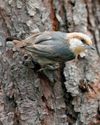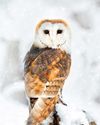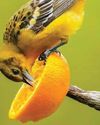
Crows and their larger cousins, the ravens, are often represented in fables and folklore. Seeing a single crow is bad luck in some cultures.
AMERICAN CROW
These super smart, big birds are jet black from crown to claw, and they can be heard cawing across the continent. Crows are ground feeders and eat almost anything: carrion, chicks, small animals, seeds, insects, earthworms, and more.
Trudy Stone, a backyard birder based in Nashville, Tennessee, respects crows for their intelligence. When she was young, Trudy's family had regular run-ins with crows, which used to collect her mom's Coppertone caps as she sat out sunbathing. "They'd steal the tops, and then they had a hidy-hole they'd put them in," she recalls.
American crows previously lived primarily in rural areas, but their habitat has changed over time. These clever creatures have used their smarts to adapt to life in cities, and are now common fixtures in urban birding.
COMMON GRACKLE
Look for glossy iridescent features on these long-tailed, beautiful blackbirds. Residing east of the Rocky Mountains, the ground feeders use their long legs to walk in lawns and fields, eating anything edible, from crops to food castoffs.
Bu hikaye Birds & Blooms dergisinin October/November 2022 sayısından alınmıştır.
Start your 7-day Magzter GOLD free trial to access thousands of curated premium stories, and 9,000+ magazines and newspapers.
Already a subscriber ? Giriş Yap
Bu hikaye Birds & Blooms dergisinin October/November 2022 sayısından alınmıştır.
Start your 7-day Magzter GOLD free trial to access thousands of curated premium stories, and 9,000+ magazines and newspapers.
Already a subscriber? Giriş Yap

Basics of Hydroponics
Use these top tips and plant picks to have a successful soil-free garden

Rooted in Resilience
These hardy perennials will thrive in most zones

Social and Supportive
Brown-headed nuthatches take a helpful approach to raising their young

All About Owl Pellets
And why you should give a hoot about them

Ask the Experts
Advice from our pros about houseplants, bird feeding and more

BRING THE OUTDOORS IN
Making a terrarium is about as close as you can get to a Zen DIY project. Once you have gathered the proper materials and squared away your plant selections, it's as simple as layering it all together and watching your mini ecosystem thrive. Here, I'll walk you through my foolproof process and cover all the required elements for good filtration, healthy soil, strong root growth and resistance against fungus and disease.

GROW THIS. NOT THAT
Six easy-to-grow houseplants—and six that may not be the right choice for you

Winter MAGIC
Forecasts may be frigid, but grab your binoculars because birding opportunities are still incredible

Sense or Nonsense? - Why some birds can taste and smell - but others can't
Does a porcelain berry taste like a blueberry to a gray catbird? Does a block of lard smell like frying bacon to a northern flicker? The short answer is no. While some avian species do have a well-adapted sense of taste or smell, they can't distinguish between flavors and odors the way humans can. They're not picking up every ingredient in the suet you put out, says José Ramírez-Garofalo, an ornithology researcher at Rutgers University in New Jersey and the director of Freshkills Biological Station in Staten Island, New York.

Maple Mania - Amazing facts about this fall foliage mainstay
Amazing facts about this fall foliage mainstay